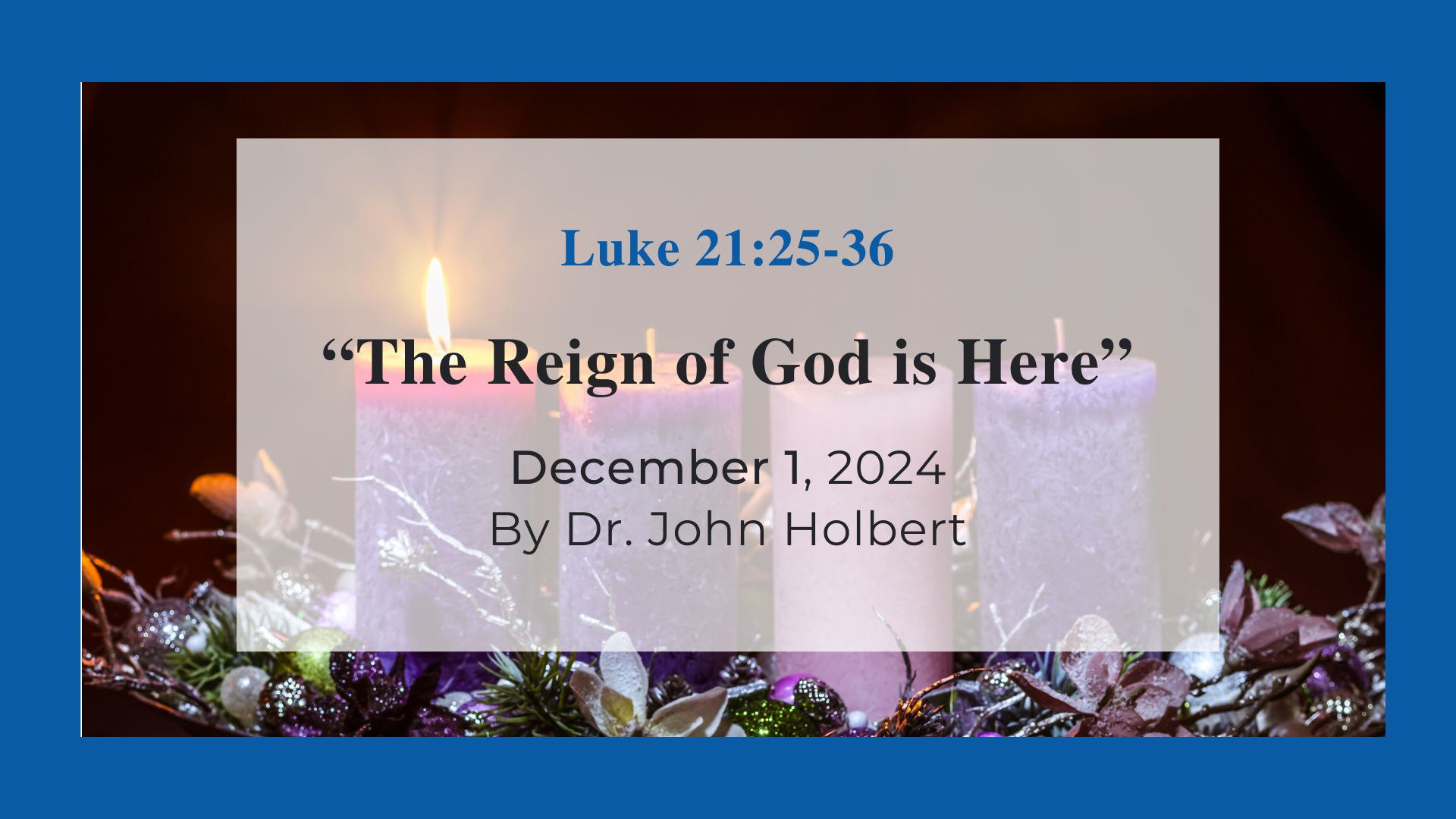The Reign of God is Here - Reflections on Luke 21:25-26, Advent1 Year C
by John Holbert on Wednesday, November 27, 2024

Today the peripatetic preacher of the Hebrew Bible texts now turns his attention to the lectionary texts of the New Testament. I hope that those of you who have over the years read my work on the left side of the Bible will follow me as I also write some reflections on the right side. By the “right,” of course, I do not mean “correct,” in the same way that “New” Testament in no way implies that the “Old” Testament is somehow dated, defunct, and devoid of value. I will attempt, beginning with this year’s Advent texts, to illuminate as well as I can texts that come from that part of our Scripture that enshrine the story of the Gospel of Jesus Messiah. To be sure, I will continue to think about those other texts from the Hebrew Bible, and will continue to write about them, too. I hope you will consider this new direction of commentary as a full complement to my earlier labors.
The first Sunday of Advent offers to us those seemingly enigmatic and harrowing apocalyptic texts from the Gospel of Luke, those mysterious passages where “sun, moon, and stars” are filled with “signs,” where “anxiety” and “confusion” plague the nations, where people “collapse from fear and dread,” where “roaring and surging seas” suggest the horrors of a world headed toward destruction, where even “the heaven will be shaken” (Luke 21:25-26). In certain parts of the Christian world, the decidedly more conservative parts, such language has served as fodder for speculations about the end of days, the rapture of the faithful, the predictions made real about the final days of all humanity, the coming of the tribulations of the earth, and the coming of Jesus to judge all things. More than a few would-be predictive preachers have filled a stadium or two with quivering listeners, eager to be saved from the terrors described by those preachers, anxious to find an escape from the furious and righteous judge who threatens all either with damnation or heavenly reward. Well, is that not a fine scenario for the First Sunday of Advent!
Let me say clearly that these mountebanks, whose primary concern appears to be less help for the fearful and more a desire to separate them from their cash, have it all wrong. A closer attention to what Luke appears to have in mind can cure such foolishness and can help us see just how appropriate this text is for Advent 1 after all.
Luke 21:30-31 is most helpful here. Referring to the “fig tree and all trees,” Luke says, “As soon as they have put out shoots, you can see and know for yourselves that summer is already here. The same is the case for you. When you see these things (the signs described in vss.25-26) happening, know that the kingdom of God (or “the rule of God;” the Greek word means an active rule more than a static place) is near.” Luke has already in his gospel revealed to us where the kingdom (rule) of God may be seen, namely in the words and works of Jesus (Luke 10:9,11), but has not been fully realized (see Luke 22:16-18 and the Passover meal to come as a fuller announcement of that coming rule). Luke goes out of his way to separate any specific historical context from this coming of the kingdom. He merely says that it is coming, and in fact has been here and promised since Jesus’ appearance on earth. This is why he warns all would-be followers in Luke 21:34-36 to “Pay attention to yourselves!” Do not weigh yourselves down with “dissipation and drunkenness and the distractions of daily life” lest you miss the kingdom altogether. “Keep awake in every season. Keep praying that you have the strength to flee all these things!”
In this way, Luke removes from the strange language of apocalypse, well known in his time, and misread often in ours, the ridiculous predictive ideas so beloved of those who refuse to understand the far simpler and far more powerful idea that Luke is announcing: those who are distracted by the world’s pleasures and dangers, like the household manager of Luke 12:45 and the parable of the sower’s concern for the “cares of daily life” (Luke 8:14), risk missing the coming of the rule of God completely. When the babe is born in Bethlehem, the kingdom of God, surprisingly and blessedly begins its progress into our lives. But that kingdom can easily be missed. The world is riddled with distractions more numerous than may be recounted. Meanwhile, the rule of God has come to us in the manger, and we must not miss its coming, either by the gaslighting of foolish speculations or the desires of a world of pleasure. “Heaven and earth will pass away,” says Jesus, “but my words will not pass away” (Luke 21:33). And those words call us all to the works of justice, righteousness, and inclusive love, in short, the very rule and reign of God.
